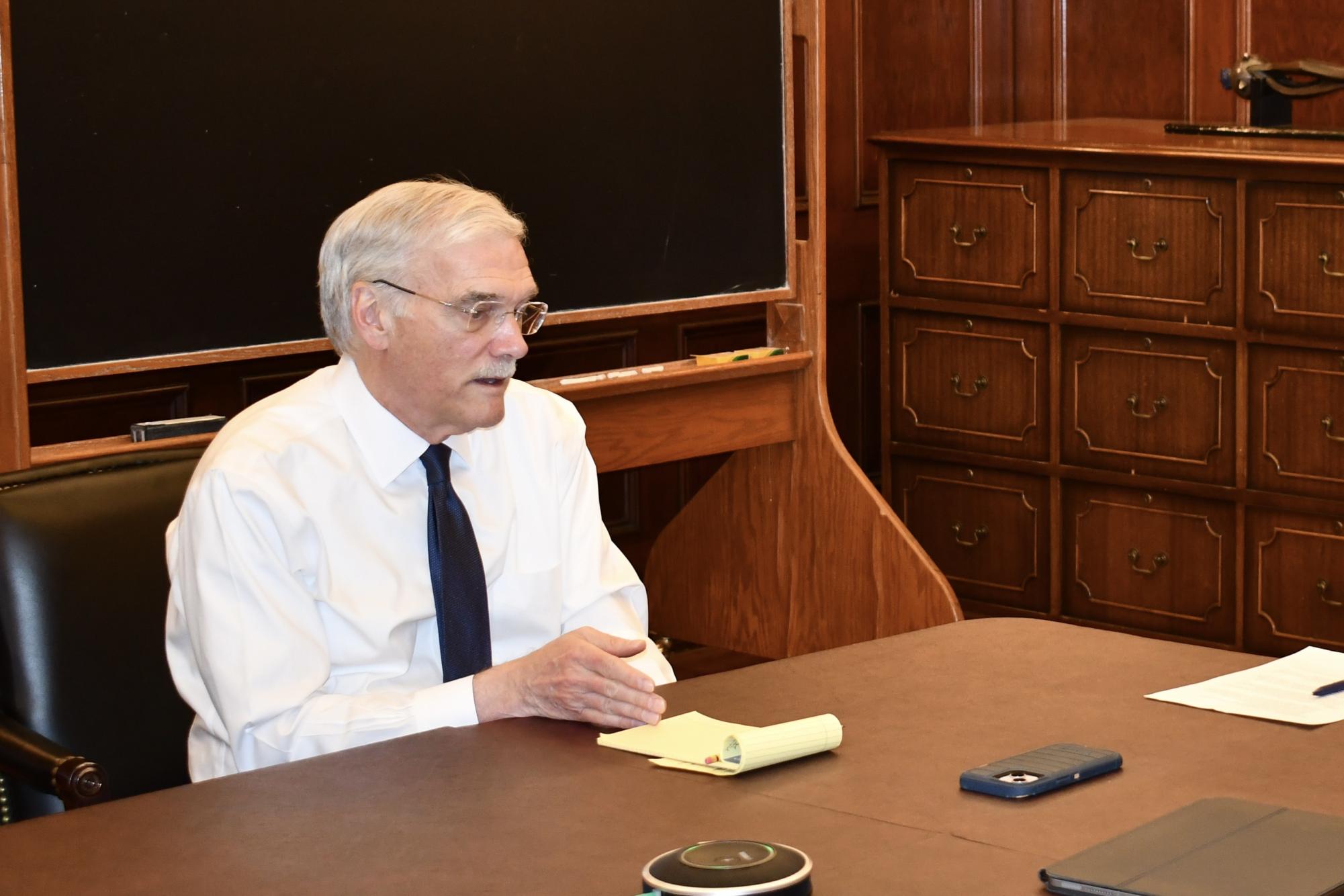Georgetown University Interim President Robert M. Groves will testify before a House of Representatives committee July 15 about the roles of foreign funding and faculty in causing antisemitism on college campuses.

The hearing, titled “Antisemitism in Higher Education: Examining the Role of Faculty, Funding, and Ideology,” is part of efforts by Republicans on the Committee on Education and Workforce to question university leadership on campus protests, sit-ins and encampments that occurred over the past two years. Groves will join Félix V. Matos Rodríguez — the chancellor of The City University of New York — and Rich Lyons — the chancellor of the University of California, Berkeley.
A university spokesperson said Groves will address how Georgetown prevents antisemitism and hate on campus.
“Interim President Groves looks forward to testifying before the Committee and describing Georgetown’s efforts to combat antisemitism,” the spokesperson wrote to The Hoya. “As a Catholic and Jesuit University, Georgetown condemns antisemitism and all forms of hatred and is committed to ensuring our university is a safe and welcoming space for every member of our community.”
In the hearing, the committee could ask Groves about antisemitic incidents occurring on Georgetown’s campus, alleged antisemitism and the connections between the university and foreign countries.
Antisemitism and Allegations of Antisemitism on Campus
Several antisemitic incidents occurred on Georgetown’s campus in the last two years. A Georgetown University community member reported the presence of a swastika on the second floor of first-year residence building Darnall Hall in January 2023. An employee at the School of Foreign Service (SFS) was placed on leave Nov. 2, 2023, for alleged antisemitic social media commentary.
This year, a poster in a residential hall was defaced with antisemitic graffiti April 15, and two Nazi swastikas etched into pillars in the Kennedy and McCarthy residential halls were discovered June 16.
A university spokesperson said Georgetown opposes antisemitism, adding that the university has taken steps to prevent antisemitism and build religious dialogue.
“Given its mission of encouraging inter-religious dialogue Georgetown has not only implemented programs and resources to prevent and address antisemitism, but has also worked to cultivate a strong interfaith mission, complete with a robust Office of Jewish Life, to ensure students from all traditions are welcomed and supported in their educational and faith journey,” the spokesperson wrote.
Members of the Georgetown community also expressed concerns about antisemitism when students voted April 29 to approve a nonbinding referendum calling on the university to divest from and disclose engagement with companies with ties to Israel’s government. The university quickly announced it would not implement the referendum, citing “institutional values and history and existing university resources and processes that address our investments.”
Georgetown’s Relationship with Qatar
Republicans on the committee also plan to focus on foreign funding of universities, which suggests Groves could face questioning regarding Georgetown’s connections to Qatar.
Georgetown first opened a campus in Qatar in 2005 and renewed its contract for another decade this year.
More than 1,000 undergraduate and graduate students have graduated from Georgetown University in Qatar (GU-Q), which hosts a range of SFS programs. The campus also offers executive and professional education programs, as well as programs for high school students.
House committees have frequently relied on testimony from conservative think tanks and think tanks supporting Israel, along with groups combating antisemitism during hearings.
In January, the Zachor Legal Institute, a think tank that opposes anti-Israel movements in the United States, sued the U.S. Department of Education to obtain records related to Georgetown’s campus in Qatar and the Center for Contemporary Arab Studies (CCAS), which conducts research and hosts events on the Arab world.
The Institute for the Study of Global Antisemitism and Policy, a nonprofit that advocates against antisemitism, released a report in June alleging that Qatar used foreign funding to influence Georgetown’s faculty, curriculum and academics, leading to a rise in antisemitism.
Conservative think tank Middle East Forum released a similar report July 7, alleging that Qatar, Turkey, Malaysia and several organizations have used Georgetown to “propagate Islamist ideology, train sympathetic academics and diplomats, and fundamentally reshape Middle East and Islamic studies.”
A university spokesperson previously said Georgetown ensures foreign contracts and relationships align with federal law and university values.
“Georgetown carefully reviews all gifts to ensure they are in alignment with our values and our educational objectives and retains full authority over expenditure decisions,” the university spokesperson wrote in April. “All of Georgetown University’s international teaching, research, and service and outreach programs adhere to core institutional values of academic excellence, institutional autonomy, academic freedom, and service to the common good.”
Georgetown Faculty
Representatives could also question Groves on Georgetown faculty and allegations of antisemitism or anti-Israel bias.
Conservative media organizations have accused faculty of fostering “extremism” and antisemitism, supporting terrorist groups and propagating false narratives about the Israel-Hamas war. The university, a faculty member and student representatives for the SFS denied those claims in November 2023, highlighting efforts to promote diverse viewpoints and dialogue.
Federal immigration officers detained Badar Khan Suri — a former senior fellow at the Alwaleed Center for Muslim-Christian Understanding (ACMCU), which seeks to foster interreligious understanding — for allegedly “spreading Hamas propaganda and promoting antisemitism on social media.” Immigration officials later released Khan Suri when a federal judge ruled that the federal government violated his free speech and due process rights. Khan Suri is currently contesting his deportation order in immigration court and the revocation of his visa in federal court.
The hearing, which comes after several hearings on antisemitism that saw various university leaders resign, reflects growing efforts by House Republicans in Congress to investigate higher education despite growing concerns about targeting free speech and academic freedom.